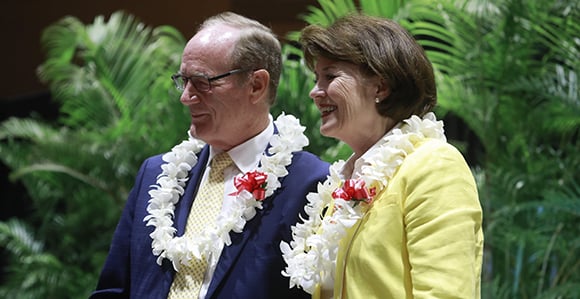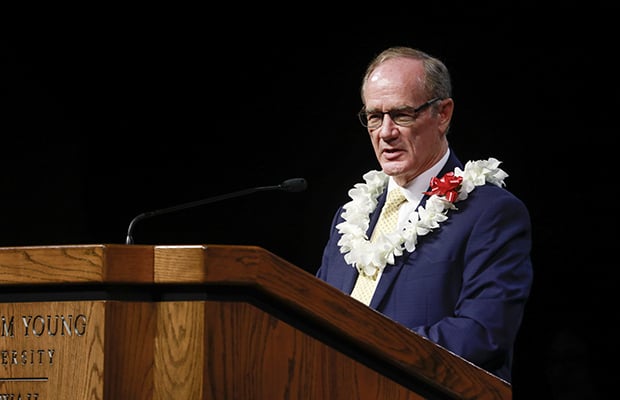Discipleship Means Changing Who We Are, Not Just What We Do, BYU–Hawaii President Says
Contributed By Valerie Johnson, Church News staff writer

President John S. Tanner and his wife, Sister Susan Tanner, greet students following a BYU–Hawaii devotional on January 15, 2019.
Article Highlights
- Becoming a new person in Christ is the ultimate purpose of discipleship.
- Internalizing doctrine and true principles is more important than going through the motions.
- Being intentional about becoming like the Savior and living the gospel brings blessings.
“The purpose of the gospel is to ‘teach us all that we must be to live with Him someday.’ It is not enough to know or to do, as important as those are. We must become like Christ.” —BYU–Hawaii President John S. Tanner
Related Links
While visiting his 98-year-old mother in Utah for Christmas, BYU–Hawaii President John S. Tanner sang “I Am a Child of God” with her. Due to her failing memory, singing songs is one thing she especially loves.
In one line of the song, President Tanner’s mother sang out, “Teach me all that I must be,” rather than “do.”
“She then stopped and began to explain, with great animation and enthusiasm as she often does, how ‘be’ expresses what the Lord really expects of us,” President Tanner said to BYU–Hawaii students during the first devotional of the semester held on January 15. His wife, Sister Susan Tanner, also spoke during the devotional.
His remarks focused on becoming a disciple of Christ, rather than going through the actions.
“While knowledge and action are important to our mission [at BYU–Hawaii], becoming is the most important of all,” he said.
President Tanner shared how in the Sermon on the Mount in the Old World and the Sermon at the Temple in the New World as recorded in the Book of Mormon, “Jesus tries to move His followers from outward observance to inward, wholehearted embrace of righteousness. From conformity to consecration.”
Christ repeatedly compared His teachings to Moses’s as He taught His higher law. “Refraining from sinning is essential but not enough,” President Tanner said. “His disciples must overcome anger and lust, they must love even their enemies, and so forth. The Lord wants us to change who we are, not just what we do. Hence His eye is ever upon our motives and our hearts.”
The great aim of discipleship is to become like Him, a new man or woman in Christ.
In applying these principles to the students’ education, President Tanner explained that while he wants them to obey the Honor Code, “we want you to internalize the principles of modesty and integrity in the Honor Code rather than just grudgingly conform to its rules.”
Getting good grades is important, but President Tanner said he wants students to come to love learning so they become lifelong learners.
Attending church and the temple are important, but truly worshipping is more so.
“In all these ways and more, we want you to become a more devout disciple here, not just to do well in school and refrain from breaking the rules,” he said.
The principle of becoming a disciple also applies to the direction President Russell M. Nelson is trying to take the Church, President Tanner said.
“It underlies the move from lower law, once-a-month visiting and home teaching to higher law, Christlike ministering. It underlies the renewed emphasis on deep and genuine Sabbath worship, on meaningful covenant making in the sacrament, on personal responsibility for gospel learning and living.”
These changes are intended to help members of Christ’s Church become more fully converted and move along the path of true discipleship.
Becoming like Christ is simple, but soul stretching, President Tanner said.
“The purpose of the gospel is to ‘teach us all that we must be to live with Him someday.’ It is not enough to know or to do, as important as those are. We must become like Christ.”
Sister Tanner focused her message on the word intentional.
While it is not found in the scriptures, there are similar phrases like “with real intent” or “with full purpose of heart.”
“All of these words mean that you work toward something with design, purpose, intention, or determination,” she said. “Having a goal or an aim or a plan is the foundation. The plan provides something on which we can focus our hearts and minds.”
This is an era that requires intentional efforts in teaching, learning, and living the gospel and striving to become like the Savior Jesus Christ, she said.
“This is not a time to be casual or half-hearted, to waffle, to be lazy, to let things just happen as they may. This is the time to gather Israel, to prepare the world for Christ’s coming.”
Sister Tanner encouraged the audience to be intentional about education, following the Honor Code, and teaching in families.
“What do the scriptures promise us if we are intentional followers of Christ?” she asked. “If we come to Him with all of our hearts, He will deliver us out of bondage, heal us, and gather us.”

President John S. Tanner speaks during a BYU–Hawaii devotional on January 15, 2019. Photo by Monique Saenz, BYU–Hawaii.

Sister Susan Tanner speaks during a BYU–Hawaii devotional on January 15, 2019. Photo by Monique Saenz, BYU–Hawaii.
